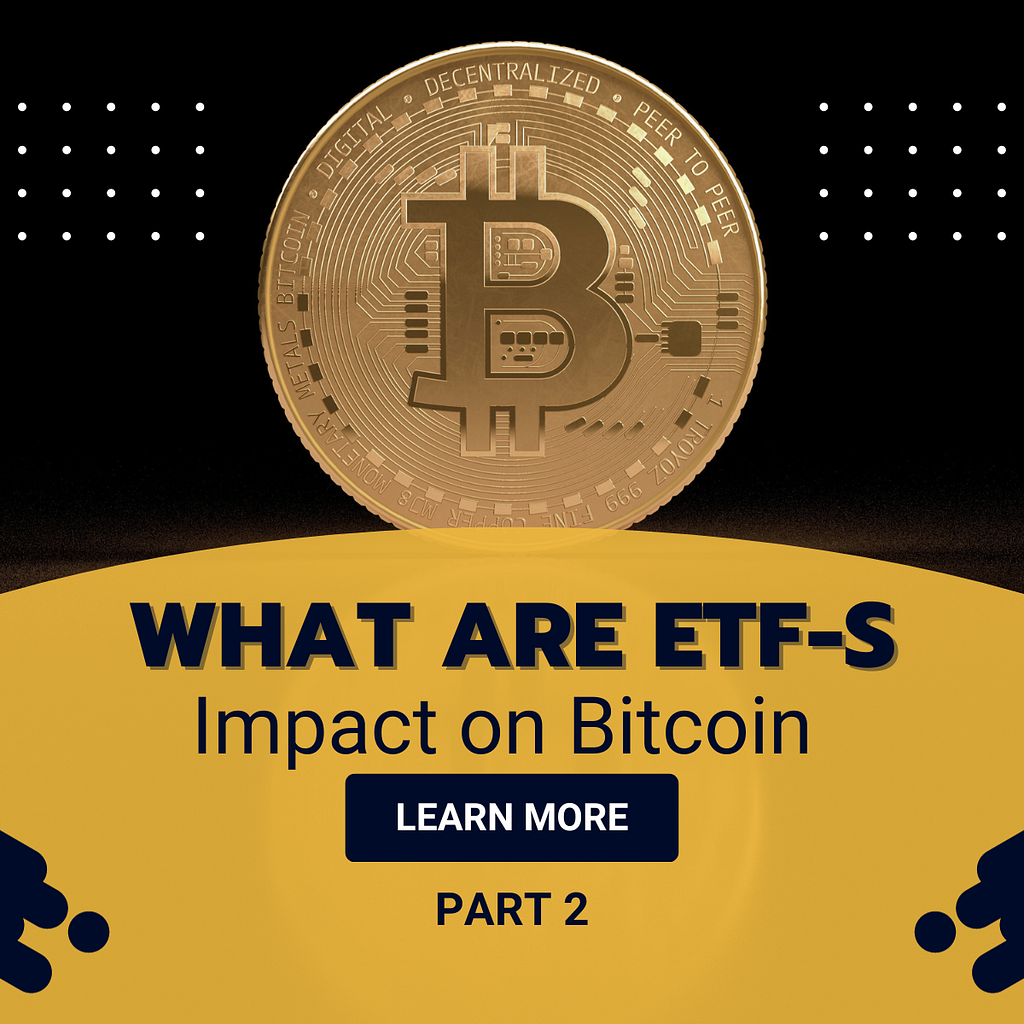What are ETFs Part 2 — Impact on Bitcoin
This article explores the concept of ETFs, their impact on the Bitcoin market, and the broader implications for both institutional and retail investors.👇
Disclaimer: This article is not financial advice and is solely based on personal experiences. It is for entertainment purposes only.
As we wrote in the first part, Exchange-Traded Funds (ETFs) have long been a staple in traditional financial markets, offering investors diversified exposure to various assets. In recent years, the influence of ETFs has extended into the realm of cryptocurrencies, particularly Bitcoin.
👉Understanding ETFs:
An ETF is a type of investment fund and exchange-traded product, comprising a collection of assets such as stocks, bonds, or commodities. It is designed to provide investors with broad market exposure and the opportunity to trade throughout the day like a stock.
👉The Mechanism of Bitcoin ETFs:
While traditional ETFs have been linked to traditional financial assets, Bitcoin ETFs are specifically tied to the price of Bitcoin. They allow investors to gain exposure to the cryptocurrency without the need to directly hold or manage Bitcoin themselves.
👉The mechanism of a Bitcoin ETF involves:
Creation and Redemption: Authorized participants create and redeem shares of the ETF based on changes in demand. This process helps maintain the ETF’s market price close to its net asset value (NAV).
Market Making: Market makers play a crucial role in facilitating the buying and selling of shares on the secondary market, ensuring liquidity and efficient price discovery.
Custody: Custodians secure the actual Bitcoin owned by the ETF, addressing concerns related to security and storage.
👉Impact of Bitcoin ETFs on the Market:
Increased Accessibility: Bitcoin ETFs make it easier for investors to gain exposure to the cryptocurrency market through their traditional brokerage accounts. This increased accessibility attracts a broader range of investors.
Institutional Participation: ETFs provide a familiar and regulated investment vehicle for institutional investors, such as pension funds and hedge funds, who may have been hesitant to directly invest in Bitcoin.
Liquidity Boost: The liquidity of the Bitcoin market can improve as ETFs attract more participants, including market makers. This can lead to smoother price discovery and reduced volatility.
Price Discovery: ETFs derive their value from the underlying assets, contributing to price discovery in the Bitcoin market. As more investors participate through ETFs, the market may become more efficient.
👉 Too much information? Do you want to take a short break?
Look at another article about the fun NTF game in the development phase — Robots.Farm, created on zkSync before you continue reading.
Exploring the Numerous Possibilities of Robots.Farm
This project is still in the development phase, but the team making it seems to have an innovative vision, so it can be kept an eye on.
👉Challenges and Considerations:
Regulatory Hurdles: The approval and regulation of Bitcoin ETFs vary across jurisdictions. Regulatory hurdles can impact the launch and operation of these funds.
Market Manipulation Concerns: The decentralized and relatively unregulated nature of the cryptocurrency market raises concerns about potential market manipulation, which could affect Bitcoin ETFs.
Custodial Risks: Custody of the underlying Bitcoin is a critical aspect of ETF operation. Ensuring secure and reputable custody solutions is essential to mitigate risks.

Future Implications:
The continued development and approval of Bitcoin ETFs may have far-reaching consequences:
Mass Adoption: Increased accessibility may contribute to the mass adoption of Bitcoin as a mainstream investment.
Market Maturation: The entry of institutional investors and the establishment of regulated investment vehicles can contribute to the maturation of the Bitcoin market.
Integration with Traditional Finance: Bitcoin ETFs may bridge the gap between traditional and crypto finance, fostering integration and collaboration.
👉A New Era for Bitcoin Investors
Bitcoin ETFs represent a significant development in the evolution of the cryptocurrency market. As these investment vehicles continue to gain traction, their impact on the accessibility, liquidity, and acceptance of Bitcoin as a legitimate asset class cannot be overstated. While challenges persist, the potential benefits for investors and the broader cryptocurrency ecosystem signal a new era for those looking to participate in the digital asset revolution through the familiarity and structure of ETFs.
👉What are ETFs — a guide for beginners — Part 1
What are ETFs — a guide for beginners — Part 1
Thank you for reading!
Wait for a second. You should be getting my articles in your inbox. Subscribe here.
If you want more articles like this, please: clap, comment, and share this article. Thank you!
What are ETFs Part 2 — Impact on Bitcoin was originally published in The Dark Side on Medium, where people are continuing the conversation by highlighting and responding to this story.
